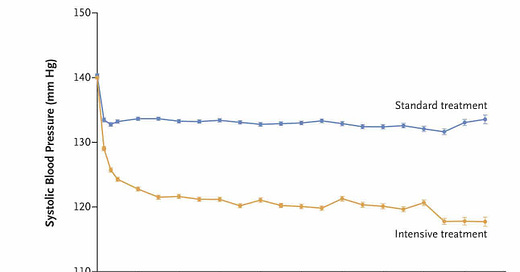More intensive blood pressure control prevented strokes in those with diabetes
December 3, 2024
Summary: Those with diabetes randomized to more intensive blood pressure control achieved lower blood pressures, had a similar rate of adverse events, and had significantly fewer strokes.
Blood Pressure Control
Source: Bi, et al New Engl J Med November 16, 2024
Researchers randomized over 12,000 people with diabetes to either be treated for high blood pressure with a target of a systolic blood pressure of 120 (tight control) or 140 (loose control). The study was reported in the New England Journal of Medicine, and was performed in China.
The graph above demonstrates that those randomized to intensive management were successful in decreasing their blood pressure. Their systolic blood pressures (the top number) were, on average, 12 mm Hg lower than those in standard treatment.
The graph below shows that this intensive treatment statistically significantly decreased rates of stroke, although did not significantly reduce the risk of heart attack, congestive heart failure or cardiac death. Total deaths were lower in the intensive treatment group, but this did not reach statistical significance. There was no difference in the rate of adverse effects between the intensive group (36.5%) and standard treatment group (36.3%).
Source: Bi, et al New Engl J Med November 16, 2024
Another study published this summer showed a 27% decrease in major cardiovascular events in those at high risk who had their high blood pressure treated intensively regardless of diabetes status.
Most people initially diagnosed with high blood pressure should be recommended to make lifestyle modifications, including salt restriction, diet, weight loss and increased exercise. Those whose blood pressure remains high can lower their risk of cardiovascular complications by taking blood pressure medications. These are generally once daily, well-tolerated, and available as inexpensive generics.
Implications for employers:
This is further evidence that intensive blood pressure treatment can reduce cardiovascular events.
As I noted last week, most Americans with high blood pressure are not aware of their condition, and few are adequately treated.
Employers can ask carriers to report on effectiveness of blood pressure treatment in their populations, and carriers can add this quality metric to their pay for performance contracts with providers.




